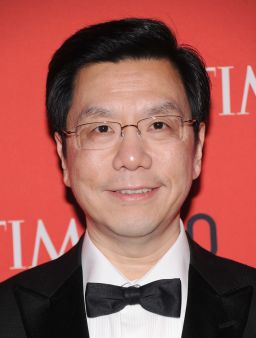Story highlights
Kai-fu Lee, Google's former China boss, has a massive following in China
He says Chinese companies are among the world's most innovative
But China's education system doesn't foster free thinking, he says
Kai-fu Lee, one of the most influential figures on China’s tech scene, is mobbed by fans when he arrives in Zhongguancun – Beijing’s answer to Silicon Valley.
A selfie with the former Google China boss turned angel investor is an opportunity not to be missed for the young entrepreneurs at techie hangout and start-up incubator People Squared.
“I thought they would want my money, but they just want photos,” Lee quips.

Born in Taiwan, Lee trained a generation of Chinese engineers during his career working for Microsoft and Google.
He quit Google in 2009 and founded Innovation Works, which invests in early stage start-ups. He’s also built up a 50-million strong fan base on Chinese social media platform Weibo – that’s more followers than Justin Timberlake has on Twitter.
Lee has witnessed China’s tech scene evolve from a place where coders used paper to a breeding ground for some of the world’s most innovative companies.
What follows is an edited Q&A with the tech pioneer:
Q: What was China’s tech scene like in the 1990s?
A: People were able to use PCs, had heard a little bit about Bill Gates and there were one or two little startups like Lenovo. But I think the concept of founding a Chinese company was still very, very new.
I remember seeing students marching out of their dorm at 11:00 p.m. with their books. I asked my colleague what was going on, and he said the dorm shut down the electricity every night, so people went out under the public lighting to read their textbooks.
In 1998, I joined Microsoft. One of my first Chinese colleagues told me that where he studied there were no computers. He learned how to program on paper and his professor graded programs on how they ran in his head. That’s how amazing, hardworking and dedicated people were.
Q: How does it compare to today?
A: The last six years have seen more measurable change than any other period for China’s entrepreneurial spirit. A few things have happened. Chinese engineers were once years, if not decades, behind their American counterparts. They caught up.
There are now great entrepreneurial role models. I saw many of my top proteges leaving and starting companies. These were really smart people that saw China as the next emerging market for the Internet. They came to Google and learned what they needed to know. They came up with ideas and then they left, and I was struck by the rate at which they were successful.
Alan Guo founded (e-commerce specialist) LightInTheBox. Si Shen launched PapayaMobile and Andy Tien’s (social gaming) company was acquired by Zynga. There’s many, many others.
Q: Can China compete with places like Silicon Valley?
A: The Internet is an environment with great rewards for people with strong execution skills. It’s not just for Steve Jobs-like brilliance.
Facebook was iterated (evolved gradually) and became great and many other companies were that way. And while China may need a little room before it can have its own Steve Jobs, I think a Chinese Mark Zuckerberg is very doable.
And if we measure it on creating valuable, innovative products that generate economic value, I think China will soon equal Silicon Valley.
I would go further to say that most Silicon Valley companies don’t have Steve Jobs’s either. They have great CEOs that love their jobs, who lead and are focused on executing.
Q: What companies in China do you consider to be truly innovative?
A: Tencent’s culture of innovation is not as famous as that of Google or Apple, but the product WeChat has changed hundreds of millions of people’s lives in more profound ways than Facebook or Google.
They were able to look at user needs and gradually push out new things one on top of the other. Chinese users can now connect with all their friends, interact simultaneously, have group discussions– and use it to buy cabbage at the market.
Even my wife, she’s not a big technology lover. I couldn’t get her to use Google, email. She has almost lived a technology-free life – I almost envy her. But the moment she discovered WeChat, she’s on the phone more than me.
Q: Could China do more to encourage innovation?
A: I think potential limitations are in two areas. One, a lot of the drive to make innovation possible is wealth. I think there should be people who do it for love. The other limitation is the education system.
It’s about individuality. It’s about people needing to be taught with an emphasis on critical thinking and curiosity.
And the Chinese education system, or I should say the Asian education system, is largely black and white. There’s always a right answer, and the teacher or the textbook will tell you what it is so don’t challenge it.
Q: What’s the power of social media in China?
A: There’s a big transition from Weibo to WeChat. At first social media was about the dissemination of information, it was more media than social.
But nowadays, the hours people spend, including myself, is way higher on WeChat than Weibo.
If you really want to follow someone you can follow their public account, but mostly things worth knowing are likely to get circulated by your friends or groups. It’s like Facebook’s dominance over Twitter.



